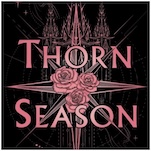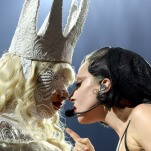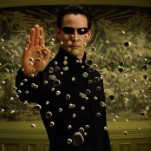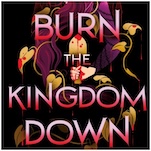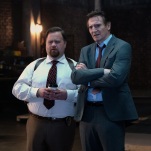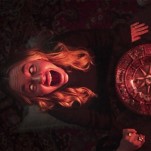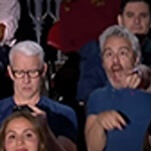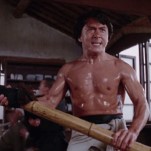The Book of Clarence Promises Satire and Spirituality, but Only Really Achieves One
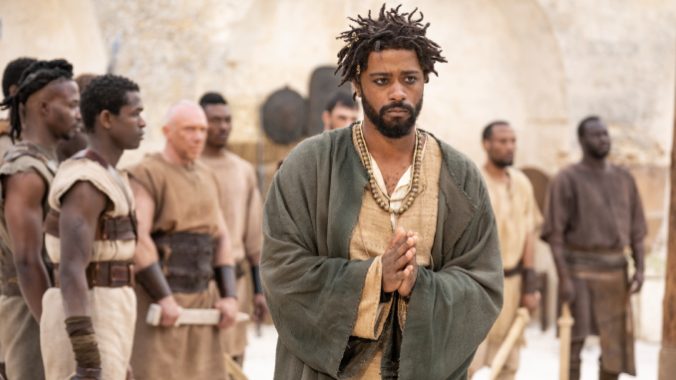
Blessed be the innovators…even when they don’t quite hit the mark. Having wowed audiences and critics with his directorial debut, The Harder They Fall, writer/director Jeymes Samuel returns with an altogether different tale in The Book of Clarence. Starring LaKeith Stanfield in the eponymous role, he plays the chronically underachieving brother of Jesus Christ’s apostle Thomas (also played by Stanfield). Existing in the shadow of pious Thomas, atheist Clarence is a good-hearted man who just can’t seem to get it together in A.D. 33 Jerusalem. Desperate to ice his “nobody” reputation and win the respect of the woman he fancies, Clarence decides to crib the playbook of aspiring messiah, Jesus of Nazareth (Nicholas Pinnock), to fast track his own path to success.
Based on that cheeky premise, The Book of Clarence is seemingly positioning itself as the literal and figurative spiritual successor to that other Jesus-centric satire, Monty Python’s The Life of Brian. An exciting prospect because, as evidenced with The Harder They Fall, Samuel’s revisionist storytelling skills are mighty. Unfortunately, the director doesn’t aspire to those heights with The Book of Clarence. While he’s brought to life a handsome film, absolutely stacked with an outstanding cast including Omar Sy, David Oyelowo, Alfre Woodard, Babs Olusanmokun and others, The Book of Clarence suffers from trying to be too many things for too many audiences. Samuel’s script is a soft religious satire, a sword-and-sandals homage, a clever reframing of Christianity from the Black perspective, and a sincere attempt at evangelism for the dispossessed. Broken into a structure of three Books, the disparate ideas mashed together result in a disjointed watch, full of memorable sequences that don’t stitch together to make a cohesive whole.
Samuel’s core concept, positioning an atheist as an observer and researcher of Jesus’ life as it’s happening, is a brilliant idea that promises a fresh perspective with bite regarding the eternal inconsistencies of the Christian church. Instead, Samuel’s script only uses Clarence to softly poke at the underbelly of those who will go on to form Christ’s church after his death and resurrection. As the well-liked “loser” of Jerusalem, Clarence is both a keen and clear-eyed observer of the confounding shift towards blind faith happening around him, and a lost soul who has hampered his own potential with crippling self-doubt. Early on, he’s a vocal and pervasive voice regarding the hypocrisies of Christ’s most ardent believers, who have dropped their families and responsibilities to follow some guy who says he’s the son of God.
Seemingly immune to the call of Jesus’ movement, Clarence’s street savvy also lends to his destructive impulsiveness. He’s “that guy” in the neighborhood who bets the money he borrowed from local heavy, Jedediah the Terrible (Eric Kofi-Abrefa), on a thrilling chariot race against Mary Magdalene (Teyana Taylor) and loses, ensuring his imminent death as the payback for his debts. With the help of his loyal best friend, Elijah (RJ Cyler), they try to concoct some schemes to wriggle out of that death sentence, from selling more weed to getting Clarence baptized so Jedediah will go easy on him as a reformed man of faith. Of course, everyone sees through Clarence’s bull, including John the Baptist (Oyelowo), who smacks him around for his blasphemy.
It’s in these pursuits during Book I and Book II that The Book of Clarence is at its lightest and most comedic, adopting an almost laconic pacing as Clarence tokes and jokes with his friends until he comes up with the ridiculous plan to first become the 13th apostle, and then a parallel messiah. Aided by a lush score and an eclectic soundtrack brimming with knee-tapping original R&B and soul songs written (and mostly sung) by Samuel, Clarence amiably stumbles through a series of Biblically familiar sequences that test his fortitude and wit, and gain him allies the likes of freed gladiator Barabbas (Sy), local miscreant Zeke (Caleb McLaughlin) and even a befuddled Mary of Nazareth (Woodard).
When Clarence decides to deconstruct Christ’s blueprint for “success” for his own purposes of gaining followers and notoriety right under Jesus’ nose, Samuel creates a ripe canvas that’s just begging for the film to go all-in with some pointed, smart satire about religion and fame. Yet the film retreats from that path—despite flirting with it from the start—and doubles down on the authenticity of Christ and his miracles. And Samuel then pivots to focus on reframing the origins of the church back to its Black roots.
-

-

-

-

-

-

-

-

-

-

-

-

-

-

-

-

-

-

-

-

-

-

-

-

-

-

-

-

-

-

-

-

-

-

-

-

-

-

-

-

















